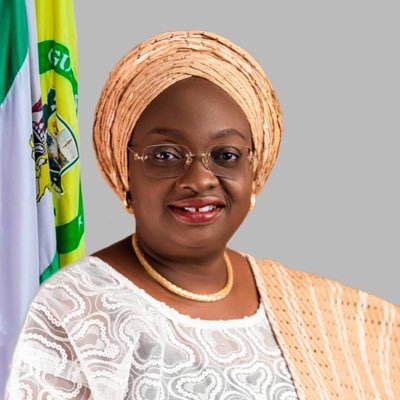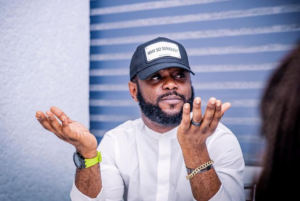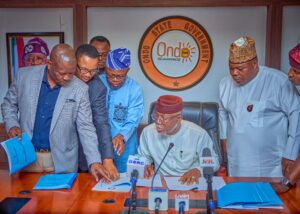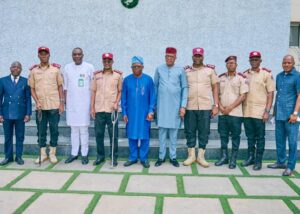Reps will ensure policing system works for all citizens ― Gbajabiamila
The Speaker of the House of Representatives, Hon Femi Gbajabiamila, On Wednesday, assured that the 9th House would ensure a policing system that works for all citizens in view of the recent #EndSARS protests.
Gbajabiamila who gave the assurance while stakeholders at the 9th House Legislative Agenda Public Policy Dialogue Series on: ‘Policing and Human Rights in Nigeria,’ underscored the need for a wholesale reform of the Nigeria Police from recruitment to training and welfare of officers and men of the Police.
The Speaker called on all well-meaning Nigerians to make their inputs toward the enactment of the Police Service Commission (Reform) Bill, 2020
“Our reform objectives include wholesale reviews of police recruitment and training procedures and practices. It also includes an obligation to drastically and rapidly improve the welfare and wellbeing of police officers from recruitment through to retirement.
“As we expect more from the men and women who carry arms and take risks to protect us, we must also be ready to do right by them, and by their families. They too are our citizens; they are our brothers and sisters deserving of the best that our nation can offer.
“I want to assure all of you in this room, all of you who are watching today from wherever you are, the 9th House of Representatives will do everything we can to deliver for the Nigerian people a policing system that works for every citizen.
“We will talk, we will engage, we will change laws, and we will amend the Constitution subject to the consensus of the Nigerian people. We will do everything that we have the power to do so that when the account of this moment is given, we will be counted for making the right choices and doing justice by our people.
“This is because we recognise that the policing function is at the very heart of any fully functioning state. It is through the institution, mechanisms and resources of policing that the state can protect the welfare and wellbeing of its citizens.
“Without the ability to offer this protection, the state loses legitimacy and the authority that flows from there. A society that cannot effectively police itself ceases to exist, and a government that fails to protect its citizens has lost the right to continue in office. We must avoid these unfortunate outcomes.
“This is why we must commend the present administration which inherited a flawed policing system and is now taking giant steps to reform the system through the recently enacted Police Reform Act, 2020 and several other measures. But the work is far from done, and we must continue in these efforts.”
Gbajabiamila affirmed that “Effective policing is only possible when the policing institutions are grounded in the rule of law, when they are accountable and when the justice system in its entirety is fair to all who have cause to appear before it. We cannot have an effective policing system when the citizens do not have faith that the Police will treat them fairly every time, no matter the circumstance.
“We do not have an effective system of policing when the relationships between communities and the Police are defined by fear and mistrust. The Police cannot be effective when the mechanisms for accountability and discipline are too weak to identify, remove and prosecute rogue officers as a matter of course.
“We will have succeeded in building modern and effective Police when service in the Nigeria Police Force consistently attracts the best and brightest in our country without objection.
“When we think about policing reforms, we must resist the urge to focus only on making new rules about police conduct, and establishing new ways of holding officers accountable for failures to meet the standards of behaviour that we expect from them. Policing reform is more profound than that. Yes, we must begin by holding officers accountable, but we cannot stop there.”
“This moment is also about our nation’s young people, a generation that never witnessed military rule, who were born into and have lived their entire lives in a democracy. Too often, and for decades, that democracy has unfortunately fallen short of their expectations,” the Speaker said.
In his remarks, the Chairman of the House Committee on Implementation and Monitoring of the Legislative Agenda, Hon Henry Nwawuba, said the 9th House has committed itself to seeking collective and holistic ways to find lasting solutions to our national needs.
Noting that his committee was set up to ensure that the House meets its agenda and live up to its best aspirations and objectives, Hon. Nwawuba said the dialogue was an innovative step in the Bill process to get stakeholders’ buy-in even before the presentation of the Bill on the floor of the House.
“We intend to collate the opinions, observations and ideas of stakeholders and citizens to form part of the Bill so that the House will consider. This interaction doesn’t usurp the legislative process of the Bill,” he said.
Also, the Chairman of the House Committee on Police Affairs, Hon Usman Bello Kumo, pledged the committee readiness to provide an enabling environment for people to cross-fertilize ideas when the Bill gets to them.
In a goodwill message, the United Nations Development Programme (UNDP) Resident Representative in Nigeria, Mohammed Yahya, said the PSC Bill is timely, noting that policing problem is not peculiar to Nigeria alone as it obtains in the entire African Continent.
On his part, the Inspector General of Police (IGP), Mohammed Adamu Abubakar, who was represented by the DIG Research and Planning, Adeleye Olusola, requested for time to dissect the Bill before coming up with a sound position.
The President of the Nigeria Bar Association (NBA), Olumide Akpata, whose organisation is one of the bodies working with the House on the Bill, said they were doing a lot to re-energise relevant bodies of the NBA to face issues of human rights violations squarely.
“This is one collaboration that we’ are proud of. The issues that confront our country and the Nigeria Police are issues that predate most of us. With regards to human rights violations, I think it’s a matter of orientation. In the proposed law, the issue of orientation is being addressed,” he said.
Also speaking, PSC Chairman, Mr Musiliu Smith, who was represented by retired Justice Clara Ogunbiyi, commended the House for coming up with the Bill, saying it would enhance the operations of the commission, requesting for more time to study the draft law.
In his intervention, the Executive Secretary of the National Human Rights Commission (NHRC), said the majority of Nigerian Police personnel were ready and qualified to do their job, but that the environment they operate on does not allow them to.
Lauding the House for the initiative, he said the Bill takes care of the independence of the commission with the security of tenure and a broad membership.
Other speakers at the dialogue such as a youth advocate, Bobo Ajudua, and the Director, Centre for Democracy and Development, Idayat Hassan, commended the House for the initiative and made some suggestions.












Post Comment